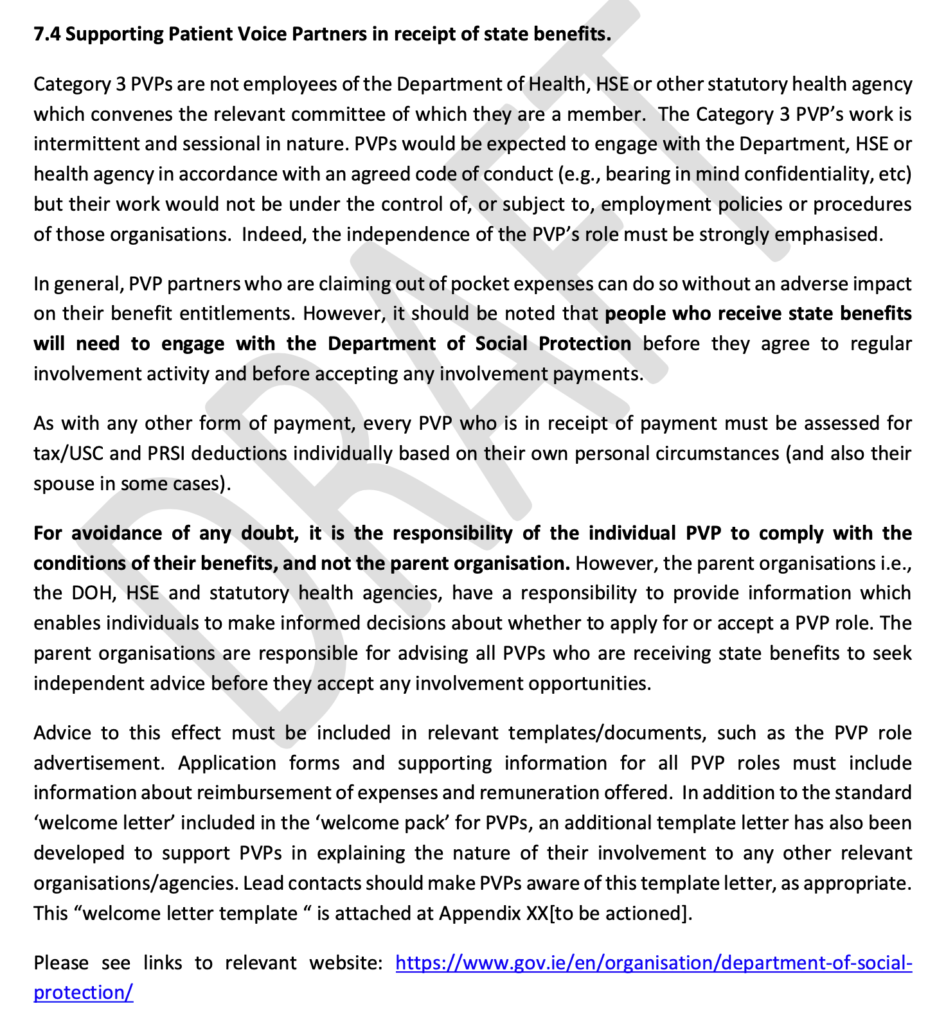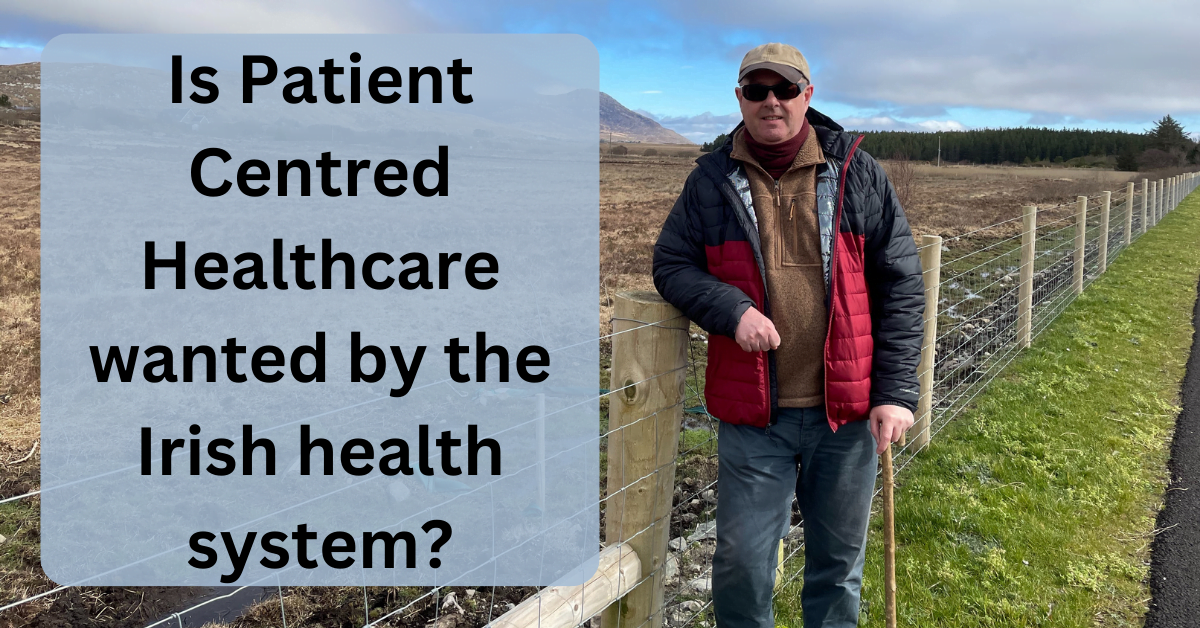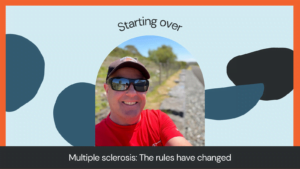For the last four years I have actively used my experience of being a patient to engage with academics, governmental and commercial organisations to put the patient at the centre of the healthcare system. I have had positive and negative experiences along the way, and I think have converted some people to engage with the patient community in a more holistic way. It has been challenging and rewarding, in equal measure.
In this time, my disability has increased, to a point last year where I had to apply for Invalidity Pension, a government support for for people like me. It was in November, 2022 when I received the letter confirming I would get this payment. A condition of receiving this is I cannot do any paid or voluntary work, effectively stopping any advocacy work I was doing.
Irelands draft Patient Voice Partners Policy
I was hoping this would change at some stage, as the HSE (Health Service Executive – the Irish health service) is integrating patients into more of their work (read more here) and and the HRB (Health Research Board) is incentivising researchers in Ireland to have patients as part of their research teams (read more here). On January 23, the Department of Health of Ireland started a consultation on a new policy on the topic of “Patient Voice Partners” and I hoped to see in this document a strengthening of this new focus of having the patient at the centre of our health system. You can read about it here.
Reading through this document, I began to realise the work of the HSE & HRB is all window dressing. The government has no real desire to include all patients, but a select few, whom I call the healthy sick. In this document they state they will not pay expenses of one group of patients, won’t pay for the time of two groups, and will only pay the for the time of expenses of a narrow group of patients, as long as they don’t work for an organisation which is part of the state sector, such as teachers, or employees of a government department.
I also noted it is the sole responsibility of the patient to deal with social welfare, if they decide to share their voice. In my case, I am not allowed to share my experience, as it could be considered work, and would jeopardise my social welfare support and my wife’s payment (she gets Carer’s Allowance, due to the severity of my disability). This situation I am in isn’t unique, and effectively excludes the most ill from sharing their voice, from being a partner in the health system.

Shocking and discriminating are two words which come to mind. There is no attempt to even hide their intent, it is plainly written.
People living with disabilities and chronic illnesses are routinely discriminated and ostracised by the social welfare system and health system in Ireland. It is well recognised our costs of living are higher, and it is very difficult to be seen as a human, and not as a disease. In this case, the people who have the most contact with the health system are excluded from participating in its improvement.
On Page 4 they state a purpose of embedding patients in health policy and service development. Given the department is taking no action to resolve the issue of patients in receipt of a social welfare support who want to take part, they should define patients as people who are financially independent, or are currently working.
Should the patient do something?
One observation which could be made is that we could contact the social welfare services to see if we could participate in research, without any impact on the services we get. This seems rational, but based on my experience with social welfare, I would not want to draw attention to myself (read about my experience here). When I was in receipt of Disability Allowance, they threatened to withdraw the payment, because I went on a holiday outside of Ireland for more than the permitted 14 days. After this situation, I had to supply countless documents over several months. It was extremely distressing at the time, and I would not expose myself to this and I am sure other recipients of supports for the ill and/or disabled would feel the same.
It appears to me the government would much prefer if I spent my day, sitting on the couch, watching daytime TV or scrolling through TikTok. The impact on my mental health, and subsequently on my physical health, of doing this could be catastrophic. My purpose in life will disappear. I will have to find something which I can do, within the walls of my home, which gives me a reason to get out of bed. Even writing this post, could be considered work, or an indication I am capable of work, thus giving them reason to withdraw this vital support, is a risk.
What should happen
The solution is simple. People in receipt of a social welfare support should be permitted to share their experience of living with their disability or illness with the Irish or EU agencies (such as the HSE or IMI), universities or the pharmaceutical industry up to a certain number of hours per week (eg 10 hours), without any impact on their supports. Any income which is earned should be taxed in the normal way.
At the moment, in Ireland, they are doing a pilot program where they will give artists (who are capable of work) €350 per week, just because they are an artist. You can read about this here. They still can do a full weeks work, without any impact on this payment. In contrast, my payment is €225 per week, with no possibility or earning anything extra. I would be better off being an artist. It seems artists are more entitled to a basic income than the ill, who through no choice of their own, cannot fully engage in the workplace. It is appalling how blatantly they disregard people like me.
Conclusion
Do I think anything will change? No, I don’t. Since I have become more disabled, I have been exposed to the reality I am someone who should not be seen or heard, according to the government of Ireland. There are many people who are working very hard to try and embed patients and the public in our health system, but the ‘system’ excludes those who have most knowledge of how health is delivered in this country.
I wonder is the situation the same in other countries?



Robert I am so sorry! I am so frustrated and sad reading this. It sounds people are punished by being useful and proactive. This separation of mental health and physical health is a torture because people who are making policy cannot understand that living with a disease which cause disability does not mean your mind and human being need to be stopped. This is so wrong! We certainly need your advocacy and expertise!
Thank you Oriana. It is incredibly disheartening to be treated like this, and I know I am not the only one. How can we hear all the patient voices, if some are blocked from being a part of the solution.
Robert, I am shocked, astounded and in total disbelief of what I’m reading. You have worked tirelessly offering your knowledge & experience as a disabled person while advocating & researching for all the disabled people in Ireland. I have no words to express my feelings ! Who better to inform the HSE about the trials and tribulations of living with a disability than a disabled person. What an enormous waste of valuable resources and input to help make the life of the disabled population better. My personal feelings of irate lean towards blatant discrimination against the disabled population. You asked about long-term disability (LTD) in other countries ? In the United States, Social Security typically allows up to 45 hours of work per month. In Canada long-term disability benefits vary depending on the policy with your employer but many policies allow you to work a minimum amount of hours a month without affecting your long-term disability payments. BTW the LTD in Canada is usually 70% of your annual working income.
I commend you for speaking up on this issue and we as a disabled community desperately need advocates like you to affect change. I thought that we lived in an era of freedom of speech. To attempt to silence one’s voice is bullying !
Una,
Thank you for your comment, and the useful information on how social security treats long term disabled in the USA and Canada. These systems seem fair, and treat the person with respect.
I will raise my voice as much as I can, but my fatigue and pain limit me, after all, I am disabled. Perhaps it is because we are physically weak, that the government feels it can treat us like this. I really hope things can change.
Robert
A very sad reality that my home country has chosen this stance Robert.We indeed have physical limitations but there is so much more to a person than their physicality. What a lack of insight by the Irish government. This decision reflects their limitation but not yours. Be proud of what you have achieved and accomplished and I really do hope that things will change. Stay strong in your conviction and I wish you well.
Una